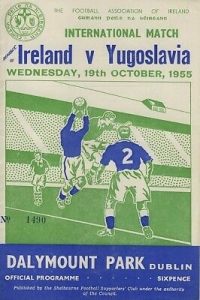
- This event has passed.
When Red Turned Green Yellow: Ireland and Yugoslavia in the Early Cold War
April 4, 2019 @ 12:00 pm - 1:00 pm
Event Navigation
Talk by Jelena Đureinović Moore Visiting Fellow 2019

This explores the Irish public reception of the establishment of state socialism in Yugoslavia and post-war trials that ensued, placing it in the wider context of anti-communism in Ireland and its religious dimension. The biggest concern in the Irish public regarding communism in Eastern Europe was the treatment of the Catholic Church – its loss of power, the rapid secularisation of society and persecution of clergy. The trials against Croatian Archbishop Stepinac and Cardinal Mindszenty from Hungary represented the most prominent causes for protest and led to the largest display of the intertwinement of the anti-communism and religion in Ireland in 1949, when 150,000 people gathered in the streets of Dublin. When Irish and Yugoslav national teams were supposed to play a friendly football match in 1952, the Football Association of Ireland quietly cancelled it, pressured by Archbishop John Charles McQuaid. The match took place in 1955, surrounded by cancellation attempts, calls for boycott, and accusations against the FAI and without support of government officials or a radio broadcast. These discourses reveal that the Yugoslav football players were not welcome, seen as representatives Josip Broz Tito, the main persecutor of Archbishop Stepinac and the Catholic Church.
The talk is a part of the larger research project that examines Ireland and Yugoslavia in the Cold War. The Cold War stands in the focus as the period when both countries had to define and re-define their state identities and negotiate their sovereignty and position in the global political order. While Ireland negotiated its post-imperial sovereignty after British rule, the Yugoslav foreign policy strived for a unique form of socialist sovereignty outside the bloc. Balancing between the micro, national, and transnational scales, the research contributes to national histories of Ireland and Yugoslavia by observing them through the novel lens of each other that also goes beyond the binary understanding of the Cold War reduced to superpower rivalry.
Jelena Đureinović is an instructor of record in East European History and a Career Development Grant recipient at the International Graduate Centre for the Study of Culture at the University of Giessen in Germany. She submitted her PhD thesis in Modern and Contemporary History in 2018, entitled ‘Glory for the Defeated: Memory of Second World War Collaboration, Resistance, and Retribution in Contemporary Serbia’, and is currently working on turning it into a book that will be published by Routledge in 2020.

